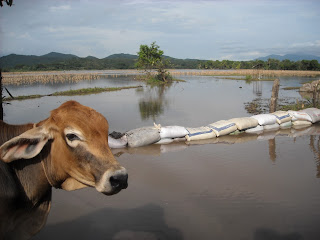I have learned so much over just a short span of four weeks. I have learned the true meaning of liberation and the many definitions of oppression. We've explored the realities of so many people, walking with them through their stories of pain, desperation, death, violence...of hope, joy, and strength.
I have met God anew.
I have seen God in the faces of the trapped gangsters that we view from the TV screen. I have heard God in the passion of the voices of the lesbians fighting for their rights. I have felt God in the energy of the volunteers at the Peace Center in Suchitoto. I have seen God in the excitement of the people of Usulutan. I have received God's word in the signs of "Basta ya!" (which mean "Enough!"). I have seen God in the patience of the little girl who taught me how to play jacks. I have heard God in the calming words of our coordinators. I have heard God in the flute music produced by teenage boys of Nueva Esperanza. I have experienced God in unexpected ways.
My view of God has been stretched, misconstrued, challenged, questioned, attacked, and transformed...and I love it.
Today I created a project about liberation theology and what my learning about it has done for me. I have discovered the many ways I myself have yet to be liberated...liberated from myself. My eyes have been open to the liberation needed back home, in the lives of the people closest to me. I have realized the need for liberation in my sisters and brothers around the world. I have learned that your own reality is not something to ignore, not something to push back. It's something to embrace.
I apologize that I'm not really getting into so much depth about this. I think that is because I am still in the process of taking in this overload of information and figuring out what it is I am being called to do with all this information.
Nothing will replace the huge amount of things that I have learned this month. In a little over week, we will be on our way to Nicaragua, to encounter yet another reality. Why won't we be there for another week?? Because we have fall break, of course! :) Tomorrow, my friend Laura and I will get on a bus heading south, first through Honduras, then through Nicaragua, then we'll arrive in Costa Rica Saturday night. We'll spend a day there, then hop on another bus to Panama and spend a few days there. Then at the end of the week, we'll make the trip back up north to Nicaragua. By the end of next week, the only Central America country (not counting the Caribbean) I will not have visited is Belize. :)
I am beat, but I hope I have more to say about El Salvador soon, when I'm not so tired.
I encourage you to do some research on this small country. I found a website for a documentary with a trailer that gives a great synopsis of the status of El Salvador: http://www.returntoelsalvador.com/. Also, there is a man who keeps a great blog about happenings in El Salvador: http://luterano.blogspot.com/. Scroll down to find a topics listing, and find something that might interest you. There are also many videos and documentaries focusing on El Salvador (I have watched Romero and La vida loca [about gangs], but there are so many more [Return to El Salvador, Which Way Home, and Si Nombre all touch on immigration].
It's a lot of info, but I need to get the word out about this small, full-of-potential nation. (And right now I just don't have the energy to type it all out!) Let me know what you know or find out about El Salvador.
As always, thanks for reading! We'd appreciate prayers as we spend a total of over 40 hours on buses in the next week. :)
Somos en búsqueda. We are always searching.






